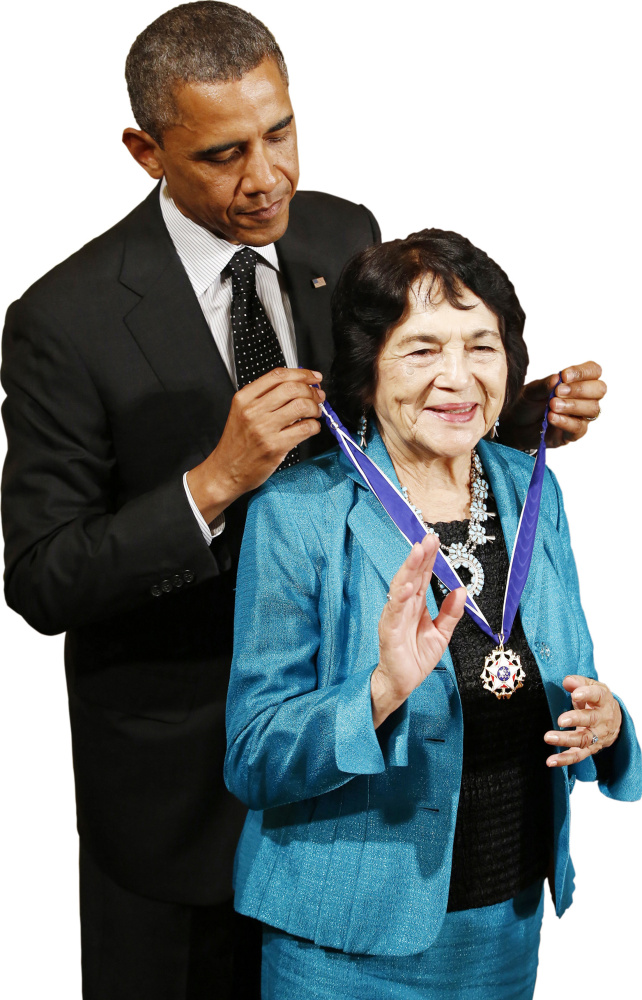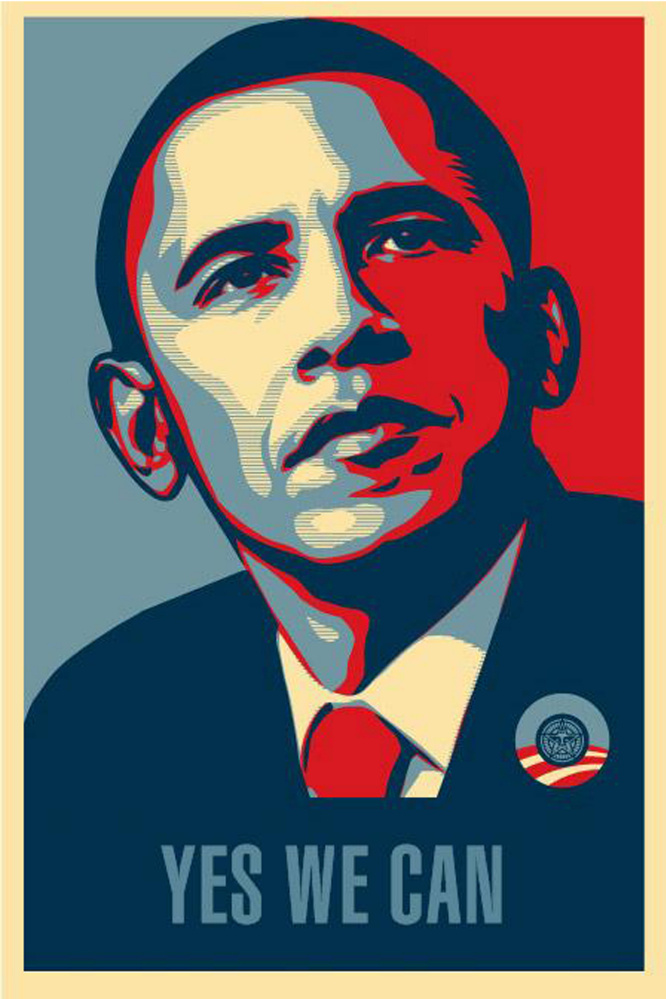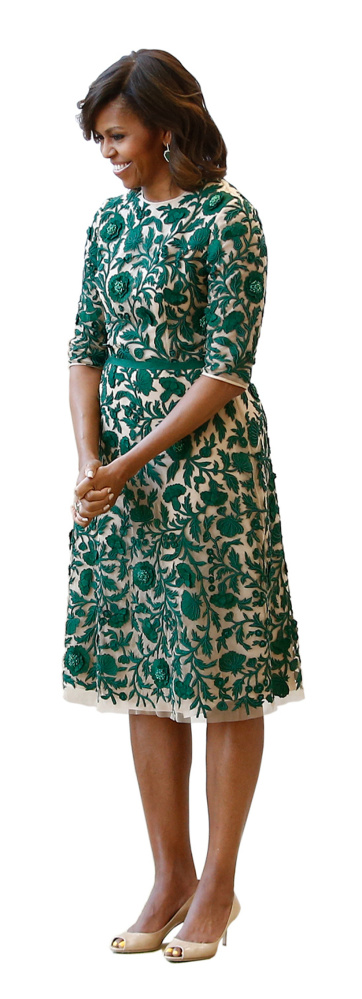President Obama bid farewell to the nation Tuesday night in the same city where he began his quest for the presidency, with the same three words that launched it.
“Yes, we can,” he said during his farewell address in Chicago. “Yes, we did. Yes, we can.”
The phrase – alongside “change we can believe in,” “Hope” and “fired up and ready to go” – is among the most indelible slogans the first black president employed to convey his political message during the last decade.
“Yes we can” defined his most famous 2008 speeches in New Hampshire and in Chicago’s Grant Park and was chanted at political rallies nationwide. It appeared on campaign posters and inspired a song and celebrity-packed music video by artist will.i.am.
And, like some of the nation’s most revered word arrangements, it almost didn’t happen.
Obama initially thought the almost lyrical catchphrase was “corny.”
His wife convinced him otherwise.
That pivotal moment for “yes we can” came in 2004, when Obama was running for the U.S. Senate in Illinois as a long-shot, “seriously underfunded” candidate, political adviser David Axelrod wrote in his 2015 memoir “Believer: My Forty Years in Politics.”
Axelrod, at the time Obama’s campaign media adviser, had written, as the very last line of Obama’s very first 30-second Senate campaign ad, the words “Yes we can.”
“The initial ad, narrated by Obama, wove his personal history of defying the odds – as the first black president of the Harvard Law Review and on issues such as death penalty reform – into a parable about breaking down barriers,” Axelrod explained in the book. “It had strong appeal to the black and liberal voters on whom we were counting. The closing lines tied his personal history to a larger theme.”
“Now they say we can’t change Washington,” the much younger Obama says in the ad. “I’m Barack Obama, I’m running for the United States Senate and I approve this message to say, ‘Yes we can!’ ”
Obama taped the ad at the home of a neighbor, Axelrod wrote, and when he read the words aloud during the first take, the young candidate “wrinkled his face and expressed a concern.”
” ‘Yes we can,’ ” he repeated. “Is that too corny?”
Michelle Obama, who had an hour of spare time and had come to watch her husband film the first ad, listened from a staircase as Axelrod explained his rationale for the final three words.
Obama was unconvinced. He turned to his wife.
“Meesh,” Axelrod recalls Obama asking. “What do you think?”
Chin in hand, she shook her head slowly, side to side, and said: “Not corny.”
“That was enough,” Axelrod wrote in the book. “My reassurance had left Obama still wondering, but he deeply trusted Michelle’s instincts and connection with people. Her imprimatur immediately sealed the deal, preserving a tag line that would become our rallying cry in this and future campaigns.”
In an interview with the New York Times Magazine about that moment in 2004, Axelrod credited the future first lady with the save.
“Thank God she was there that day,” he told the Times.
Though Obama’s origin story with the phrase began in 2004, its roots as a unifying slogan for community organizers dates back to the time of American labor leader Cesar Chavez, who co-founded with Dolores Huerta the United Farm Workers Association (later the United Farm Workers) and first uttered the words in Spanish.
“Si, se puede,” he said during his 25-day Fast for Love in 1972 after the Arizona legislature passed a bill sponsored by the Farm Bureau denying farmworkers the right to strike during harvest seasons, according to the Cesar Chavez Foundation.
Just a few days into his strike, weakened and bedridden, Chavez, with Huerta by his side, was briefed by Latino labor and political leaders fighting the bill. They told him the grower lobby was too strong and efforts to fight it were futile.
“No, no se puede!” they told him.
“No, no it can’t be done.”
Still in bed, Chavez lifted his head from the pillow and whispered: “Si, si se puede!”
“Yes, yes, it can be done.”
“Dolores Huerta immediately understood the significance of the words and made the slogan the rallying cry for the farmworkers’ campaign in Arizona,” the Foundation wrote, adding that “si se puede!” went on to be “adopted worldwide, inspiring advocates of everything from other labor struggles and community empowerment to civil rights and immigrant rights.”
Obama’s 2008 use of the more colloquial translation of the phrase, “Yes we can,” is probably the most popular iteration of the rallying cry. At a campaign rally in Nevada that same year, his crowd chanted the Spanish version – “Si, se puede!” – and the candidate chimed in, a move that drew some criticism at the time because the UFW had endorsed his Democratic primary challenger, Hillary Clinton.
But the Cesar Chavez Foundation told Time magazine in 2008 that it didn’t mind Obama employing the phrase:
“The foundation itself is comfortable with him using the slogan ‘Si Se Puede’ and so is the UFW to a certain extent,” said Paul Chavez, who works with the foundation. “Being that the UFW is very strongly for organized labor and they have a very strong commitment to the Clinton camp there was some conflict internally. The way that it played out was that as long as any individual, whether it’s Hillary, whether it’s Obama, maintains and supports the standards of what the slogan is … we’re comfortable with it because we really feel that it shouldn’t be limited to just one camp. It’s a battle cry, a call to action whether it’s to voting or getting out and participating in the political process.”
Years later, in 2012, when Obama was handing out that year’s Presidential Medals of Freedom, he credited Huerta with coining the three-word phrase that defined the UFW movement and now his own ascent.
“Dolores was very gracious when I told her I had stolen her slogan, ‘Si, se puede.’ Yes, we can,” Obama said during the Medal of Freedom ceremony. “Knowing her, I’m pleased she let me off easy, because Dolores does not play.”
Obama revived the Spanish phrase once more in an address to the Cuban people in March.
And in Chicago Tuesday night, the president bookended his presidency with the signature words – with a nod to the theme of “change” that resonated with many Americans during his eight years in office.
“I am asking you to believe. Not in my ability to bring about change, but in yours,” he said. “I am asking you to hold fast to that faith written into our founding documents; that idea whispered by slaves and abolitionists; that spirit sung by immigrants and homesteaders and those who marched for justice; that creed reaffirmed by those who planted flags from foreign battlefields to the surface of the moon; a creed at the core of every American whose story is not yet written:
Yes, we can.
Yes, we did.
Yes, we can.”
Send questions/comments to the editors.





Success. Please wait for the page to reload. If the page does not reload within 5 seconds, please refresh the page.
Enter your email and password to access comments.
Hi, to comment on stories you must . This profile is in addition to your subscription and website login.
Already have a commenting profile? .
Invalid username/password.
Please check your email to confirm and complete your registration.
Only subscribers are eligible to post comments. Please subscribe or login first for digital access. Here’s why.
Use the form below to reset your password. When you've submitted your account email, we will send an email with a reset code.